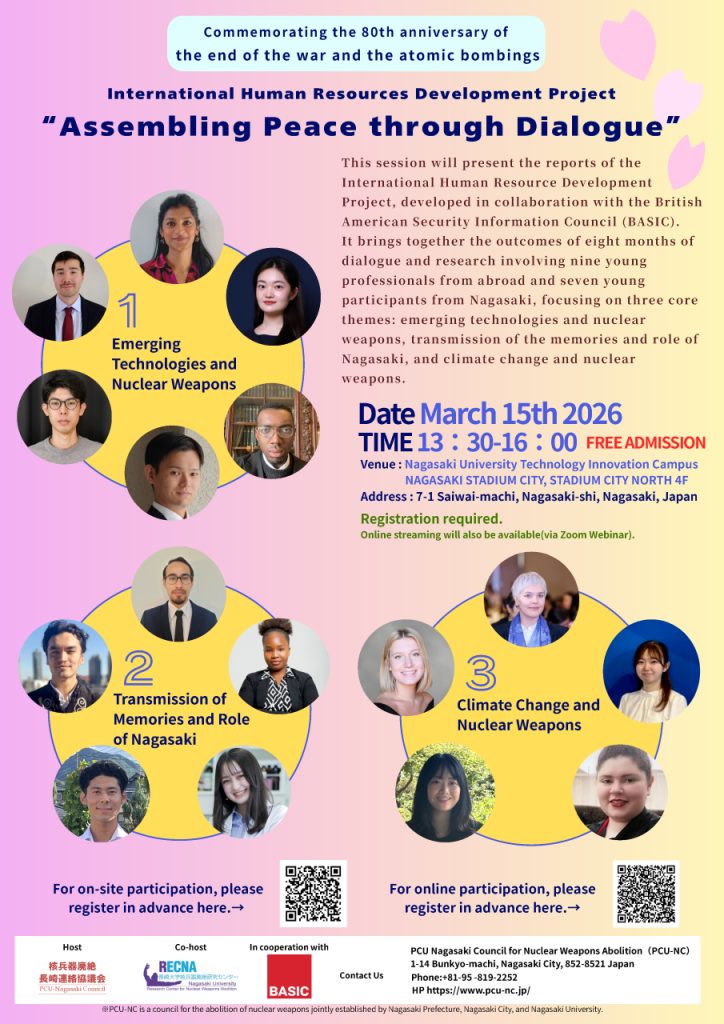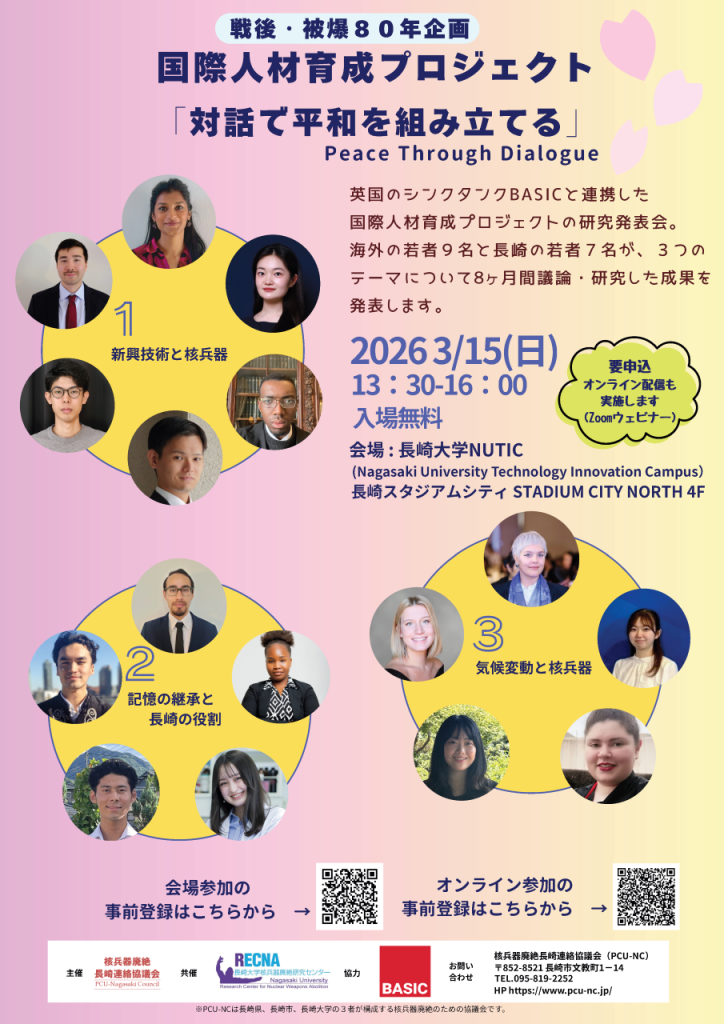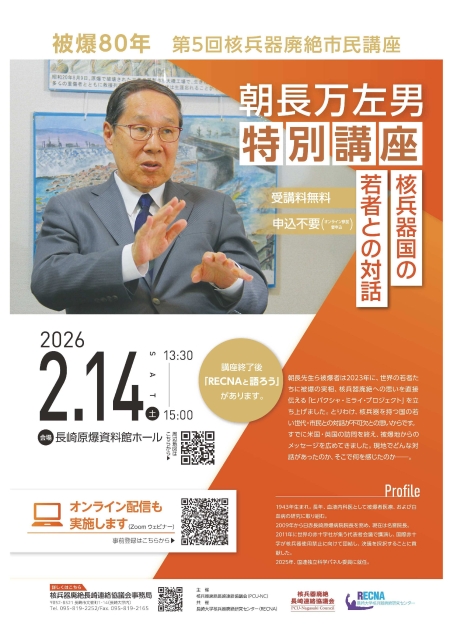2026年1月15日
Risk at the Intersections: The Nuclear Impacts of Emerging Technologies(交錯する複数のリスク:新興技術がもたらす核への影響)
RECNAは、ストックホルム国際平和研究所(SIPRI)および国連軍縮研究所(UNIDIR)と協力し、国際会議
“Risk at the Intersections: The Nuclear Impacts of Emerging Technologies”(交錯する複数のリスク:新興技術がもたらす核への影響)をジュネーブで開催します。
本イベントは、人工知能、自律型システム、サイバー、宇宙領域などの新興技術が、核兵器および関連システムと交差することで生じる核リスクとエスカレーション経路を検討します。あわせて、核兵器使用がもたらす人道、環境、健康、社会経済の影響に関する最新の研究と政策的含意を共有し、分野横断的な対話を促進します。2026年NPT運用検討会議や国連の核戦争影響に関する議論を見据え、包括的な核リスク低減と軍備管理と軍縮の課題を整理します。
本イベントは対面とオンラインのハイブリッド形式で開催され、日本からはオンラインでの一般参加が可能です。
■日 時:2026年1月22日(木)23日(金)※時刻は全て現地時間(CET)
■会 場:Maison de la Paix(スイス・ジュネーブ)およびオンライン(Zoomウェビナー)
■対 象:核兵器問題や新興技術に関心を有する政府関係者、研究者、専門家、関心のある方
■言 語:英語のみ
■参加方法:現地参加はこちら /オンライン参加はこちら からお申込下さい。※登録の際は、英語での記入をお願いいたします。
■プログラム:
AGENDA: DAY 1 (22 JANUARY 2026)
Opening remarks (10:50-11:00 CET)
Session 1 (11:00-12:30)
The Risk Nexus of Emerging Technologies
This session explores how developments in artificial intelligence, cyber capabilities, and outer space intersect with nuclear weapons and related systems. It identifies potential pathways through which their interactions can increase risk of escalation, including nuclear use.
Panelists:
1. Ms. Fei Su (Stockholm International Peace Research Institute, SIPRI)
2. Dr. Jong-Jin Lee (The Institute for Peace and Unification Studies, Seoul National University)
3. Dr. Yasmin Afina (United Nations Institute for Disarmament Research)
4. Dr. Michiru Nishida (Research Center for Nuclear Weapons Abolition (RECNA), Nagsaki University)
Moderator: Dr. Wilfred Wan (SIPRI)
Session 2 (13:30-15:00)
The Adaptability of Nuclear Governance
This session considers ways in which elements of the global nuclear order have addressed technological challenges in the past, and their capacity to reduce risks current and future. It will also reflect on technological futures, including the exponential advancement of artificial intelligence. Furthermore, the session will examine how accelerating climate change intensifies risks by fuelling tensions, undermining governance, and compounding systemic threats across security, environmental, and technological domains. Illustrative cases—such as the growing geopolitical competition in the Arctic region—highlight how environmental transformation can reshape geopolitical and nuclear dynamics, even in regions traditionally viewed as global commons.
Panelists:
1. Dr. Florian Krampe (SIPRI)
2. Dr. Nick Ritchie (University of York)
3. Dr. Chiew Ping Hoo (East Asian International Relations (EAIR) Caucus)
4. Dr. Radomir Compel (Research Center for Nuclear Weapons Abolition, Nagasaki University)
Moderator: Dr. Tytti Erasto (SIPRI)
Session 3 (15:30-17:00)
Expanding the Conversation
This session explores evolving trends in the nuclear landscape, highlighting the growing interest in nuclear energy and the broader applications of nuclear technology for peaceful purposes. It also examines approaches to operationalizing a multi-stakeholder governance framework in response to this changing environment.
Panelists:
1. Mr. Shota Kamishima (International Atomic Energy Agency, IAEA)
2. Mr. Simon Cleobury (Geneva Centre for Security Policy, GCSP)
3. Mr. Almuntaser Albalawi (UNIDIR)
4. Ms. Maria Garzon Maceda (TBC, United Nations Office for Disarmament Affairs, UNODA)
Moderator: Ms. Sarah Ruth Opatowski (UNIDIR)
AGENDA: DAY 2 (23 JANUARY 2026)
Session 4 (9:00-10:30)
The Effects of Nuclear War in the 21st Century
Against the backdrop of the ongoing UN panel on nuclear war effects, this session examines new research pertaining to the humanitarian, environmental, health, and socioeconomic consequences of nuclear weapons use. It also considers how scientific and policy conversations can be more effectively bridged.
Panelists:
1. Mr. Charles Johnson (International Physicians for the Prevention of Nuclear War, IPPNW)
2. Dr. Renata Hessmann Dalaqua (UNIDIR)
3. Mr. Paul Ingram (Global Stability Network)
4. Prof. Dr. Masao Tomonaga (UN Panel on the Effects of Nuclear War)
Moderator: Dr. Jaroslav Krasny (RECNA)
Session 5 (11:00-12:30)
Lessons Learned across Regimes
This panel considers ways in which other multilateral regimes have considered governance issues linked to technological development. This includes exploration of the opportunities and risks generated by the advance and diffusion of biotechnology in the context of the Biological and Toxin Weapons Convention, as well as the role of the ChemTech Centre and the Scientific Advisory Board in the context of the Chemical Weapons Convention.
Panelists:
1. Dr. Clarissa Rios Rojas (Biological Weapons Convention, Implementation Support Unit, UNODA).
2. Dr. Artem Lazarev (United Nations Office on Drugs and Crime, UNODC)
3. Dr. Peter Hotchkiss (Organisation for the Prohibition of Chemical Weapons)
4. Dr. Emanuelle Tuerlings (World Health Organization)
Moderator: Dr. Kazuko Hikawa (RECNA)
Session 6 (13:30-15:00)
Addressing Risk at the Intersections
The final session seeks to synthesize insights from previous panels. Building on discussions of climate change, global trends towards militarization, and emerging technologies, it explores broad, cross-cutting strategies for managing 3/4compounded risks and considers how these can be operationalized in upcoming multilateral nuclear processes—including the 2026 NPT Review Conference, the 4th Meeting of States Parties of the Treaty on the Prohibition of Nuclear Weapons, and other key forums.
Panelists:
1. Mr. Michael Spies (UNODA)
2. Ms. Dongyoun Cho (The International Institute for Strategic Studies)
3. Dr. Tom Sauer (University of Antwerps)
4. Dr. Andrey Baklitskiy (UNIDIR)
Moderator: Dr. James Revill (UNIDIR)
■主 催:ストックホルム国際平和研究所(SIPRI)、国連軍縮研究所(UNIDIR)、長崎大学核兵器廃絶研究センター(RECNA)
■お問い合せ先:ヤロスラフ・クラースニー教授(krasnyj[@]nagasaki-u.ac.jp)
 This session will present the reports of the International Human Resource Development Project, developed in collaboration with the British American Security Information Council (BASIC).
This session will present the reports of the International Human Resource Development Project, developed in collaboration with the British American Security Information Council (BASIC).

















